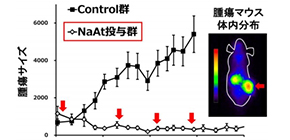
Breakthrough alpha-ray treatment of cancer without external radiation
Osaka University researchers produced astatine (At-211) using a large accelerator, which enabled highly therapeutic alpha rays to be used in nuclear medicine treatment to suppress refractory thyroid cancer
For many years, radioactive iodine which emits beta rays has been used for treatment of thyroid cancer. Generally, 5-year survival rates may exceed 90%. However, some thyroid tumors become resistant to iodine treatment (“iodine-refractory”), and a breakthrough approach is needed. Many research groups have attempted to determine new methods for treatment of iodine-refractory thyroid cancer; none have shown compelling results—until now.
A research team led by Jun Hatazawa has studied targeted alpha therapy which has higher therapeutic effects while limiting damage to normal surrounding cells. In a new study published in the Journal of Nuclear Medicine , the researchers used a large accelerator in the Nuclear Physics Research Center and the facilities of the Institute for Radiation Science to successfully manufacture a therapeutic drug, sodium astatide for injection, which emits highly therapeutic alpha rays from At-211 ions.
“When we administered the therapeutic drug, sodium astatide, to mice that had received grafts of thyroid cancer cells, we noted a marked tumor regression effect due to alpha-ray exposure,” says Tadashi Watabe, corresponding author on the study. “In particular, the mice with higher doses of sodium astatide survived for nearly three times as long as untreated mice, and their tumors were several-fold smaller in size.”
In the study, mice with thyroid cancer cells showed transient weight loss when they received higher doses of sodium astatide. Notably, mice that received lower doses of sodium astatide showed considerable tumor suppression without weight loss, indicating that fractionated alpha-ray exposure may allow effective treatment without severe side effects. As a next step, preparations are being made for a clinical trial of sodium astatide therapy for alpha-ray treatment of iodine-refractory thyroid cancer with multiple metastases.
Sodium astatide radiation therapy provides systemic alpha-ray exposure that is expected to be an innovative treatment for a variety of cancers with multiple metastases, including refractory thyroid cancer. Most importantly, injection of the sodium astatide therapeutic drug may enable breakthrough outpatient treatment of cancerous lesions throughout the body without involving external radiation therapy.

Fig.1 Treatment effect after the administration of sodium astatide with the distribution image of the xenograft mice.
(Credit: Department of Nuclear Medicine, Osaka University Graduate School of Medicine)

Fig.2 Comparison between alpha ray and beta ray.
(Credit: Department of Nuclear Medicine, Osaka University Graduate School of Medicine)

Fig.3 Difference between external radiation therapy and nuclear medicine treatment.
(Credit: Department of Nuclear Medicine, Osaka University Graduate School of Medicine)
The article, "Enhancement of astatine-211 uptake via the sodium iodide symporter by the addition of ascorbic acid in targeted alpha therapy of thyroid cancer," was published in the Journal of Nuclear Medicine at DOI: https://doi.org/10.2967/jnumed.118.222638 .
Related links
